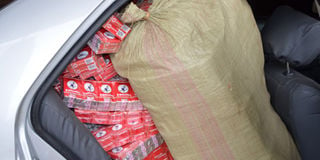URA starts implementation of digital tax stamp system

To address smuggling. Digital stamps will, according to URA, address smuggling and illicit trade of products such as cigarettes. FILE PHOTO
Uganda Revenue Authority (URA) has started the implementation of the Digital Tax Stamps system.
Speaking during the launch of the taxpayers’ appreciation month for Northern Uganda in Gulu at the weekend, Mr Cyprian Chillanyang, the URA business policy assistant commissioner, said the implementation had already started, noting that the rollout plan, which will have its first phase implemented throughout the 2019/20 financial year, will start with water, beer, soda, juices, cigarettes and other soft drinks.
“Right now we are preparing soda and water factories to install equipment. Government has contracted a Swiss company (SICPA) that is going to put these tracking features in factories,” Mr Chillanyang said.
In Kabarole, Ms Patience Rubagumya, the URA commissioner legal services and board affairs, said during the award ceremony for best taxpayers in Fort Portal that various interventions, key among them, digital stamps and electronic fiscal devices, had been put in place to ensure compliance at a time when the tax agency is seeking to collect about Shs20.3 trillion in the 2019/20 financial year.
“The electronic fiscal device will help us to collect more taxes and reduce smuggling and entry of counterfeits,” she said, noting that the machines will be relaying data to URA for effective assessment and record keeping.
Digital tax stamps are physical paper stamps applied to goods or their packaging containing among other things, security features to prevent counterfeiting, tracking capabilities that aid URA’s monitoring of compliance of the product in order to curb tax evasion and increase revenue collection.
Once stamped, a product can be verified by URA agents for authenticity using specialised digital equipment.
The roll out of digital stamps had been delayed by the lack of resources after Parliament in May queried more than Shs103b, which URA had requested through a supplementary request to implement the system.
URA was also put to task to explain why it had procured the services of SICPA without a competitive bidding process.
A section of traders and private sector players have also recently asked URA not to introduce a system that will transfer burdensome costs on an already loaded business community.
Recently, Ms Barbara Mulwana, the Uganda Manufacturers Association chairperson, said: “We are very disturbed about the digital tax stamps, in a way it is negative and it is going to add to the costs of doing business.”
Digital stamps, according to URA, will address challenges of illicit trade, counterfeit products and unfair competition.
“… we want to ensure that consumers are not duped into buying fake products.” Mr Chillanyang said.
According to Uganda National Bureau of Standards, nearly 54 per cent of products on the Ugandan market are either faked or counterfeited.
URA has previously implemented tax stamping although in a version it says was too manual and became prone to forgery.


